Books
Books

Antonio Obá: Rituals of Care
Antonio Obá: Rituals of Care traces the practice of the Brazilian artist since 2016, offering a broad survey of his recent work, dwelling on the recurring motifs and iconographic sources that feed the complex imagery of his painting. Extensively illustrated, the book returns the richness of Obá's paintings, with enlargements on some of the details woven into the pictorial texture that, in addition to showing his masterful technique, make certain elements of his visual vocabulary stand out.
The conversation between Andrea Bellini and Antonio Obá that opens the book offers the opportunity to learn, through the artist's voice, about the key passages of his research, and to examine his diverse cultural references—from the Baroque of Minas Gerais to traditional Chinese painting, from Rembrandt to the Catholic ex-votos—until we discover the Obá's civic vocation, of painting as a spiritual practice.
The two essays commissioned for the occasion analyze the complexity of these layered signifiers. Lorraine Mendes's essay "Every Boy Is a King" offers an in-depth analysis of Obá's religious syncretism. It suggests an interpretation of its layered symbols, particularly the sankofa and the deity Exú, both of which pay tribute to the artist's West African roots. Above and beyond the specific cultural contexts of this iconography, the author emphasizes the universal value of Obá's work, its evocative, transformative, dynamic power, which—like music or dance—knows no national boundaries or barriers.
Larry Ossei-Mensah's essay "Embodiment: The Art of Antonio Obá" investigates the complex cultural legacy that is intertwined with the artist's practice, connected to his Afro-Brazilian roots, to the social and political realities of the Black diaspora, and to Christian, Candomblé, and Umbanda traditions. In addition to examining the context in which Obá's work is rooted, the author situates it within a galaxy of artists who have focused on questions of identity, often using their own bodies as tools of social and cultural critique.
Completing the book is a chronology, compiled by Sara De Chiara, tracing the artist's formative years and exhibition history, accompanied by rich documentary materials.
Published on the occasion of Antonio Obá: Rituals of Care, the first mid-career survey in Europe dedicated to the Brazilian artist, curated by Andrea Bellini, at the Centre d'Art Contemporain Genève, in 2025.
Antonio Obá (born 1983 in Ceilândia, Brazil) lives and works in Brasília. His multifaceted practice encompasses painting, sculpture, photography, installation, video, and performance. His œuvre interrogates and subverts historical representations, reappropriating spiritual practices and stigmas of racism. Obá endeavors to reclaim his African heritage in a societal framework that has historically sought to dilute Black culture. His works therefore confront the violence inflicted over centuries upon African-Brazilian traditions and communities with new narratives.

Semi-Nomadic Debt-Ridden Bedouins
Semi-Nomadic Debt-Ridden Bedouins offers an in-depth look at nearly two decades of artistic output by the Palestinian artist and filmmaker Basma al-Sharif. Retracing her practice from recent works back to her earliest experiments, the book provides an original overview of how her visual language and conceptual concerns have evolved over time.
Basma al-Sharif's films and installations navigate the unstable terrains of displacement, colonialism, and representation—often shaped by the ongoing reality of the occupation of Palestine. Through a rich selection of images and curatorial essays, the monograph highlights the layered political and cinematic frameworks within which her works are embedded.
Also included are two newly commissioned literary contributions: a fictional piece by Karim Kattan that resonates with the themes of place and estrangement, and a conversation between al-Sharif and the artist Diego Marcon, in which they reflect on shared affinities, artistic processes, and their long-standing dialogue. Blurring the personal and the political, the real and the imagined, Semi-Nomadic Debt-Ridden Bedouins captures the complexity and urgency of al-Sharif's artistic journey.
Texts by Basma al-Sharif, Karim Kattan, Diego Marcon, et al.
Basma al-Sharif (born 1983 in Koweit) is a Palestinian artist working in cinema and installation. She developed her practice nomadically between the Middle East, Europe, and North America and is currently based in Berlin. Her practice looks at cyclical political conflicts and confronts the legacy of colonialism through satirical, immersive, and lyrical works.
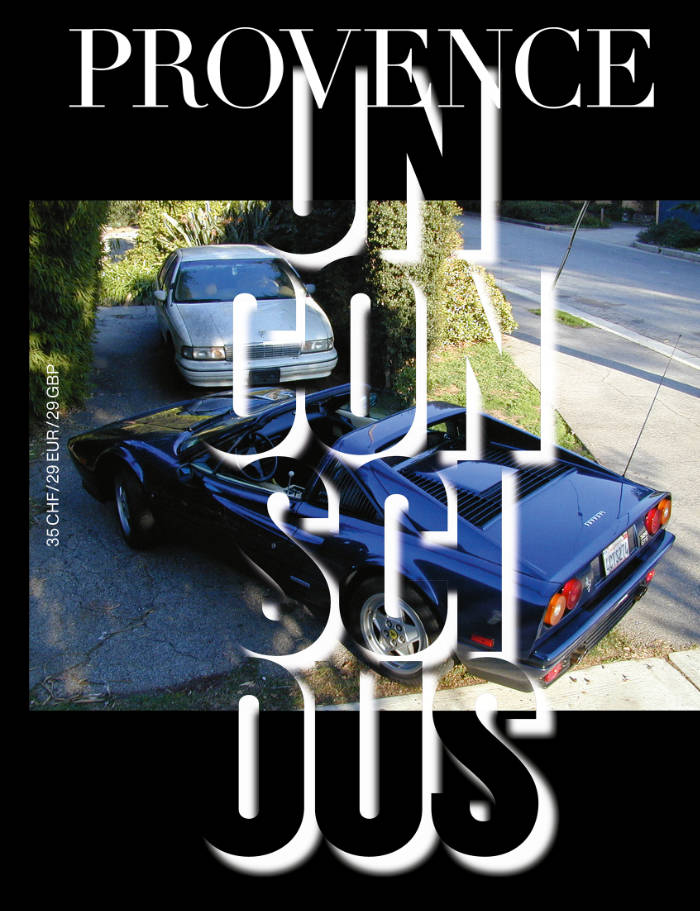
PROVENCE UNCONSCIOUS
PROVENCE UNCONSCIOUS deep dives into the cosmological pool that shapes the collective unconscious and takes a look at the relevance of Jung's ideas in relation to contemporary art and fashion.
PROVENCE UNCONSCIOUS draws inspiration from the Zurich-based office's proximity to the C.G. Jung Institute in Küsnacht—recently and notably visited by Pamela Anderson, who also appears in the publication. PROVENCE UNCONSCIOUS focuses on the work of three US-American artists—Mike Kelley, Matt Mullican, and Jason Rhoades—whose practices orbit around the themes of psychoanalysis and the unconscious. The issue also features collaged analog photographs of Laura Langer's spiral paintings, and a manuscript-style dream archive: over 30 hand-written or drawn submissions by artists, curators, jungians, and writers. Additional sections include, among many other things, jewelry by Bernhard Schobinger, photographs by Calla Henkel and Max Pitegoff, and a curatorial exploration of Emma Jung—analyst and wife of C.G. Jung—shedding light on the often-overlooked feminine legacy within Jungian thought.
PROVENCE UNCONSCIOUS didn't include any cooking recipes. And no, PROVENCE is not a magazine—but if it were, it would probably be the most radical one among its contemporary art peers.
Edited by Tobias Kaspar, Paolo Baggi, Samuel Haitz, Nina Hollensteiner, Claire Shiying Li, Veronika Dorosheva, Tatjana Hub.
Contributions by Pamela Anderson, Nina Hollensteiner & Claire Shiying Li, Forrest Bess, Matt Mullican, Mike Kelley, Valerie Smith, Delcy Morelos, Jimmy Raskin, Petra von bechtolsheim, Elizabeth leuenberger, Laura Langer, Bernhard Schobinger, Sophie Gogl, Susan Hiller, Calla & Max Pitegoff, Emma Jung, Rebecca Ackroyd, Korakrit Arunanondchai, Claire Shiying Li, Séverine Heizmann, Olga Fröbe-Kapteyn, Raphael Gygax, Stefano Carpani, Sabrina Tarasoff lITeRaTURe, Leda Bourgogne, Olamiju Fajemisin, Veronika Dorosheva, Lera Polivanova, Edgars Gluhovs.

Beau Geste Press
The “catalogue dé-raisonné” of all the printed matter produced by the independent publishing house Beau Geste Press, that federated visual poets, neo-Dadaists and international artists affiliated with the Fluxus movement from 1971 to 1976.
The independent publishing house Beau Geste Press (BGP) was founded in 1971 by the Mexican artists' couple Martha Hellion and Felipe Ehrenberg. Together with their two children, they moved into a farmhouse in Devon, in the English countryside, where, joined by a group of friends including the artist and art historian David Mayor, the graphic designer Chris Welch and his partner Madeleine Gallard, they formed 'a community of duplicators, printers, and artisans'.
Beau Geste Press was active until 1976, printing publications by visual poets, neo-Dadaists and international artists affiliated with the Fluxus movement. Specialising in limited-edition artists' books, it published the work of its own members, but also that of many of their colleagues worldwide. In the spirit of cottage industry, Beau Geste Press adapted its methods and scale of production to its needs, keeping all stages, from design and printing to distribution, under the same—bucolic—roof.
Although it operated from the periphery of the main artistic centres of its time, Beau Geste Press was undoubtedly one of the most productive and influential publishing ventures of its generation.
Published by the CAPC musée d'art contemporain de Bordeaux in collaboration with Bom Dia Boa Tarde Boa Noite, this reference book surveys the history of the independent publishing house Beau Geste Press (BGP) through the publications of its founding members Felipe Ehrenberg, Martha Hellion, David Mayor and Chris Welch, and of the numerous visitors to its rural outpost from 1971 to 1976. A “catalogue dé-raisonné” of all the printed matter produced by BGP, it is complemented by critical essays and first-hand texts that explore the working methods (economy and autonomy of production, distribution of books via post) and document the international influence of this short-lived “community of duplicators, printers, and artisans”.
Essays by Karen Di Franco, Zanna Gilbert, Polly Gregson, Carmen Juliá, Alice Motard, Mila Waldeck ; original texts by Allen Fisher, Mike Leggett, Clive Phillpot, Cecilia Vicuña.
Editions by Claudio Bertoni, Ulises Carrión, Helen Chadwick, GJ de Rook, Felipe Ehrenberg, Matthias Ehrenberg, Yaël Ehrenberg, Allen Fisher, Ken Friedman, Mick Gibbs, Klaus Groh, Kristján Guðmundsson, Mary Harding, Woody Haut, Jan Hendrix, Jarosław Kozłowski, Myra Landau, Michael Leggett, Rafael López, Raúl Marroquin, Pepe Maya, David Mayor, Anthony McCall, Victor Musgrave, Opal L. Nations, Colin Naylor, Michael Nyman, Ryo & Hiroko Koike, Takako Saito, Carolee Schneemann, Sitting Dog & Co, Endre Tót, Yukio Tsuchiya, Ben Vautier, Cecilia Vicuña, Chris Welch, Hideki Yoshida...
Each book is accompanied by five unprecedented bookmarks.

Spectres #05 – Diffusion
François J. Bonnet, Bartolomé Sanson
The fifth issue of the annual publication dedicated to sound and music experimentation, co-published by Shelter Press and Ina GRM – Groupe de Recherches Musicales, on the theme of diffusion and dissemination.
In a 1955 pamphlet entitled Seven Years of Musique Concrète, Jacques Poullin wrote:
"[...] sound projection in a concert hall is a logical extension of the concerns of the Groupe de Recherches de Musique Concrète and requires its technicians to properly study multiple aspects of the problems of sonorisation that are often neglected and to date have been almost exclusively the preserve of 'public address' technicians".
From the very beginning, fixed media electroacoustic music in its various guises faced a significant challenge: that of how it could be shared with the public. Even before it was distributed in the form of records, musique concrète, having first been transmitted on radio, soon turned to the concert stage. From the time of its birth, a twofold question was posed: What strategy of diffusion could be used for this music which involves no live performers? But also, how could it make use of existing systems of sound amplification without losing its singular nature, making sure to preserve its own particularities? Identified very early on, these questions have lost none of their pertinence some seventy years later.
Under pressure from the cultural industries and faced with a largely commercially-driven standardisation of formats, it is important today to reaffirm both the singular nature of experimental electroacoustic practices, and the possibilities these practices open up beyond standards and rules.
This calls for an exploration of the vast domain of sound creation in which, here and there, ideas, concepts, and sometimes new works appear that fully embrace the question of the deployment of sound, its dissemination and its expansion. An exploration focussed on the listening experience—a fundamentally musical experience—but adopting a critical approach which may sometimes call into question traditional ways of sharing and listening to sound, the status of listener and creator, and which may even challenge the acoustic integrity of venues and the legitimacy of diffusion systems.
Such are the questions to be addressed here. Sketching out the contours of what is quite obviously a huge subject, this volume, drawing upon a wide variety of points of view, experiences, and ideas, hints at an entire critical apparatus that remains to be developed and consolidated, but is crucial given the primordial importance of the theme of dissemination. For dissemination is the transitional stage par excellence, the uncertain stage that sits between creation and reception while at the same time determining both. It is a critical stage, yet one that is often neglected or, as Poullin says, left to a technical intermediary who may impose conditions entirely exogenous to questions of music and listening.
For these reasons, it seems more necessary than ever to return to the experience of sounds, to once again listen attentively to their trajectories, their diffraction in space, their emergence and their disappearance. To get to grips with the mysteries of their deployment so as to reaffirm that this deployment is essential to them.
Edited by François J. Bonnet and Bartolomé Sanson.
Contributions by Marja Ahti, Scott Arford, Nicolas Debade, Michael Gatt, Tim Ingold, Rolf Julius, Jules Négrier, John Richards, Marina Rosenfeld, Hildegard Westerkamp, Randy Yau.
Spectres is an annual publication dedicated to sound and music experimentation, co-published by Shelter Press and Ina GRM – Groupe de Recherches Musicales.
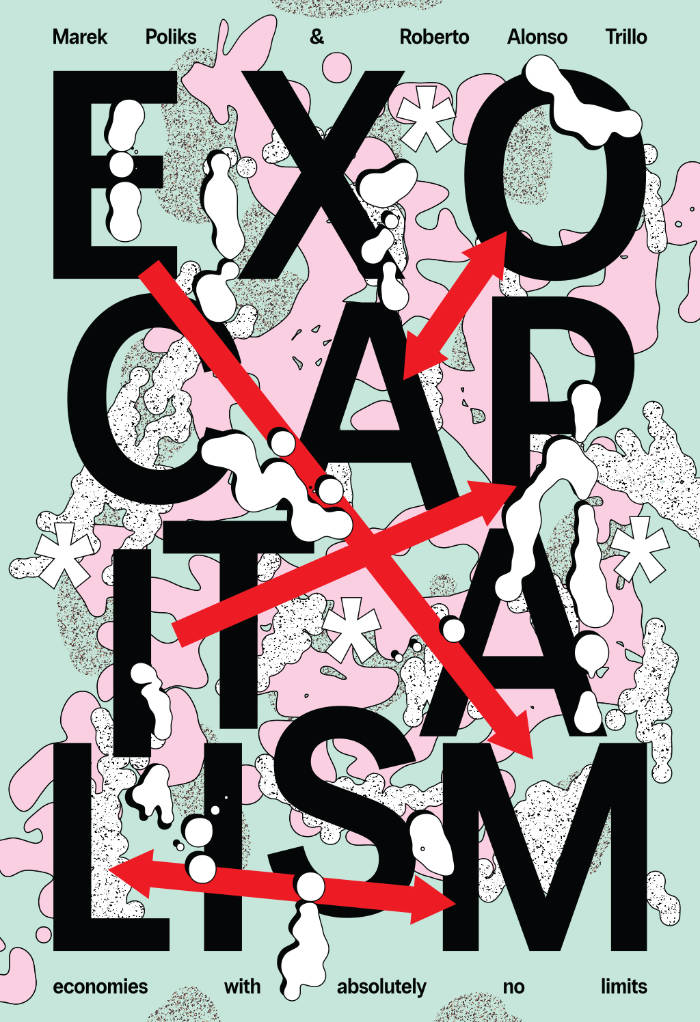
Exocapitalism – Economies with absolutely no limits
Roberto Alonso Trillo, Marek Poliks
A rigorous and mind-blowing account of the dynamics of capitalism today through an in-depth exposition of software, speculative finance, and the highest scales of arbitrage.
At the centre of Marek Poliks and Roberto Alonso Trillo's argument is the idea that capital does not belong to humans, it belongs to—and is governed by—itself. Traditional economic theory struggles to keep up with the rapid rate of acceleration, and this book steps in to address this:
"The critical orthodoxy is slowing; it's tired, it's not especially good at the internet, it's probably never manned a Starbucks counter or an anonymous cubicle. Its younger adepts—though digitally native—are chronically underemployed, unavailable, drowning in the student debt (or student opportunity cost) required for entry into the critical apparatus. Few have any patience for the numbing slop-speak of the LinkedIn economy, the libertarian enclave of forex and HFT and memecoins, the quarter-zip depravity of employment at the charnel houses of McKinsey or Deloitte or Accenture, the blazingly random mood-swings of venture capital that lubricate all of the above. This impatience is—in the parlance of the above—a blocker: it means that the critical apparatus underestimates the power of the software economy, struggles to articulate the morphological density of digitally-realized capitalism, comprehensively ignores the functional death of labor, and doesn't understand scale."
Introduction by Charles Mudede.
Afterword by Alex Quicho.
"A masterpiece... Nick Land for adults."
— 0nty

A breeze over the Mediterranean
The catalogue of the Lebanese-American artist's first exhibition in Italy.
Over fifty years, Simone Fattal's multifaceted work has explored the impact of displacement as well as the episteme of archeology and mythology, drawing from a range of sources including war narratives, landscape painting, ancient history, and poetry. The artist imagery blends history with memory, grappling with the losses of time while revealing its repetitions.
This book documents Fattal's first solo show in Italy titled A breeze over the Mediterranean at the Fondazione ICA, Milan, in collaboration with Pompeii Commitment. Archaeological Matters.
Texts by Alberto Salvadori, Andrea Viliani, Etel Adnan, Simone Fattal.
Simone Fattal (born 1942 in Damascus) is a Lebanese-American painter, sculptor and ceramist. After studying philosophy, first in Beirut and then Paris, Fattal returned to Beirut in 1969 and began life as a painter—creating sensuous abstract works that diverged from the predominantly figurative paintings commonly exhibited in Lebanon at the time. In 1980, after a decade spent in Lebanon as a painter, Fattal fled the civil war, abandoned her painting practice, and settled in Sausalito, California, where she founded the revolutionary publishing house Post-Apollo Press. In 1988, after studying sculpture in San Francisco, Fattal was consumed by another wave of creativity that led her to pursue ceramic sculptures—a medium in which she continues to work to this day from her studio in Paris.

On Dangerous Ground
Vaginal Davis offers insights into her collaborative practice of making music in art-punk bands in Los Angles and Berlin.
The artist Vaginal Davis certainly moves on dangerous ground with her transgressive shuffling of gender and genre boundaries. The self-described "sexual repulsive" co-founded several art/punk bands in her expansive 40-year-plus career, namely Afro Sisters, ¡Cholita!, Pedro, Muriel & Esther (PME), black fag and Tenderloin. As a writer and "Whoracle et Delphi", Ms. Davis turns her quirky hairy eyeball to the collective practice of making music in the saucy underground scenes of Los Angeles and Berlin. In their contributions, longtime comrades and collaborators Bibbe Hansen (artist and Warhol Silver Factory habitué) and Felix Knoke (guest performer for The Hidden Cameras and band member of Tenderloin) rave about joint performances and rehearsals, divulging sacred secrets and rifts. Bruce "Judy" LaBruce, Glen Meadmore and Lisa "Suckdog" Carver make surprise guest appearances, along with images from live performance spectacles The White to Be Angry, Trust Fund, Interracial Dating Game, We're Taking Over, Afro De Sade and Camp/Anti-Camp: A Queer Guide to Everyday Life.
Edited by Jenny Schlenzka and Julia Grosse.
Texts and works by Vaginal Davis, Bibbe Hansen, Felix Knoke.
Published on the occasion of Vaginal Davis's exhibition at Gropius Bau, Berlin, in 2025.
Vaginal Davis is a Berlin-based American intersexed artist, queer icon of art and music. Vaginal Davis herself is a living work of art: a performer, writer and creator of iconic zines; a visual artist, experimental filmmaker; a self-proclaimed Blacktress and drag terrorist, a gossip columnist, influential socialite, educator and countercultural renegade. Since the late 1970s, her oeuvre has pushed the boundaries of art, music and performance. Inspired by the militancy of the Black Panthers’ pursuit of social justice in the United States, she named herself after feminist and Black Power activist Angela Davis.

The Winter Sun
Fanny Howe's richly contemplative The Winter Sun is a collection of essays on childhood, language, and meaning by one of America's most original contemporary poets.
Through a collage of reflections on people, places, and times that have been part of her life, Howe shows the origins and requirements of "a vocation that has no name." She finds proof of this in the lives of others—Jacques Lusseyran, who, though blind, wrote about his inner vision, surviving inside a concentration camp during World War II; the Scottish nun Sara Grant and Abbé Dubois, both of whom lived extensively in India where their vocation led them; the English novelists Antonia White and Emily Brontë; and the fifth-century philosopher and poet Bharthari. With interludes referring to her own place and situation, Howe makes this book into a Progress rather than a memoir.
The Winter Sun displays the same power as found in her highly praised collection of essays, The Wedding Dress, a book described by James Carroll as an "unflinching but exhilarating look at real religion, the American desolation, a woman's life, and, always, the redemption of literature."
Fanny Howe is the author of more than twenty books of poetry and prose. She has won a fellowship from the Guggenheim Foundation and an award from the Academy of Arts and Letters.
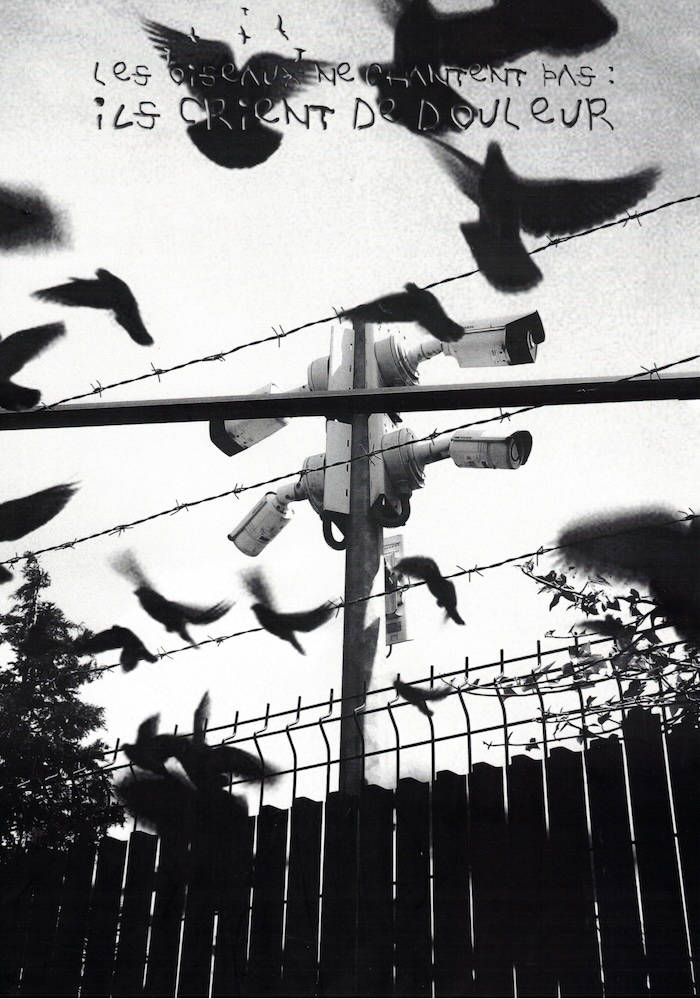
Miam 09 : Les oiseaux ne chantent pas : ils crient de douleur
4SPIKE & howawfulallanis, Alex Less, Alice Royer, Alligataure, Amelie Clicquot, Anjol, Arañada, Axel Fievet , Axelle Bourguignon, Baron & Tosma, Charlie Cooper, Charlotte Sallan Gémard, Délora Abbal, Elliott Sanchez, Erimoczi, femo, Fleur Douglas, Gaia Bergelin & Inès Camrla, Justine Bouvet, Kara, Kiara Patry, Lilian Magardeau & Elisa Grondin, Loreleï, Lucile Moreau, Manon Souza, Marie Martin Design, Mira, Migraine, Nathan Peron, Nathanael Brelin, Nomaison, Ema Tomas, Othilie Jourde Ledoux, Piquico , Rémy Bellariva, Séraphin Degroote Ferrera et Arthur Diguet, Syan Fischer, Tanikawa Sari, Vanessa Kintzel, Virginie Contier, Viviane Le Borgne, Zoé Vincent.
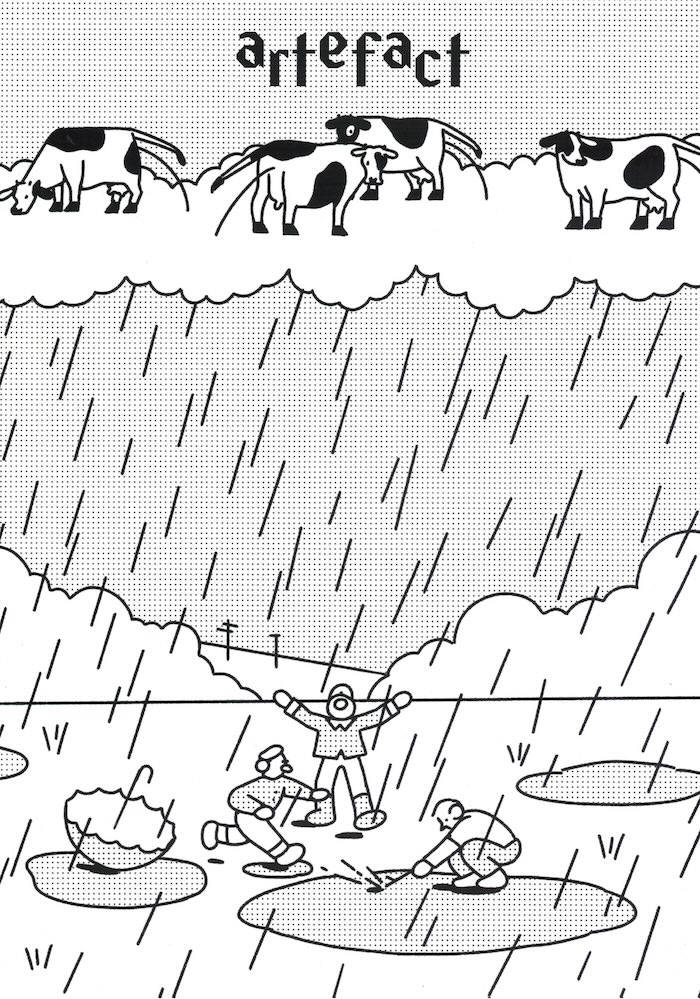
Miam 08 : Artefact
"Cet ouvrage est un magazine participatif regroupant les oeuvres de 48 artistes autour d'un thème commun, l'artefact. Vertige du passé ou projection contemporaine, l'artefact nous parle. Il raconte les cultures, en façonne le souvenir et promet ainsi un voyage à travers les créations humaines. Ce sont ces témoignages tangibles de l'existence que nous souhaitons vous offrir grâce aux interprétations captivantes de l'artefact. Chaque page de ce nouveau numéro est une invitation à plonger dans les méandres de l'histoire ou de la fiction, à explorer les différentes strates de l'humanité à travers le primes de ses réalisations matérielles."
Alexandre Daram, Alice Royer, Audrey Poujoula, Audrey Ramos, Basile, Bordel j’ai glissé, Cel, Charlie Udave, Collectif IPN, Elliott Sanchez, Emilia Pesty, Marie Derrien, Fils Kurylak, Flora Rushiti, Hélène Berlemon, Inès Day, Julie Plantefeve, Kaspar kaspar.wtf, Kawani DS, Kiara Patry, Laura Zanti, Lauriane Rolo, Le Bayou Club Graphique, Lea Canovas, Lili Archer, Lily Terrible, Lisa Dehove, Lola Marty, Louis Kervel, Lutine Cabarrou, Maeva Iorio, Maké, Martin Régnier, Maxoy, Meuneurol, Nathanael Brelin, Nurzen & Jack Montaly, Oscar, Pierre Touron, Ptit Lylou, Rachel Roland, Rose Meybeck, Sarah Josserand, Theo Grandchamp.
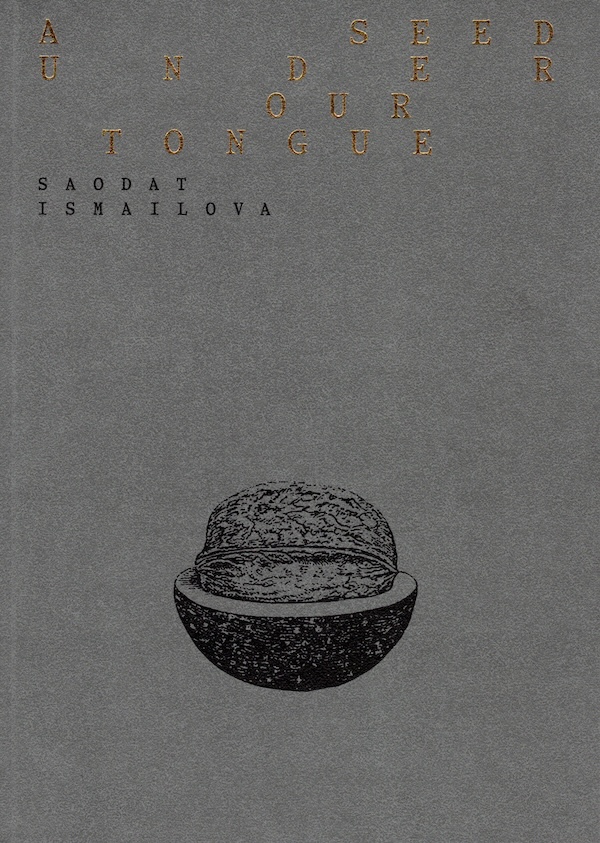
A Seed Under Our Tongue
Set in various Uzbek landscapes spanning time and place, Ismailova's films weave a storied tapestry of ancestral folklore, traditional craft and colonial resistance. By Saodat Ismailova, with Roberta Tenconi, Erika Balsom, Marcella Lista, Dilda Ramazan and Rolando Vázquez.
Uzbek artist Saodat Ismailova (born 1981) is part of the first generation of Central Asian filmmakers following the collapse of the Soviet Union. Her films emphasize long shots that evoke the aesthetics of slow cinema, often combined with archival footage and installed within textile sculptural elements drawn from vernacular traditions, as in the exhibition at Pirelli Hangar Bicocca in Milan, which this volume refers to. Exploring the collective memories of her home region, Ismailova interweaves myths with personal dreams to address social issues such as women's emancipation, identity and the colonial past.
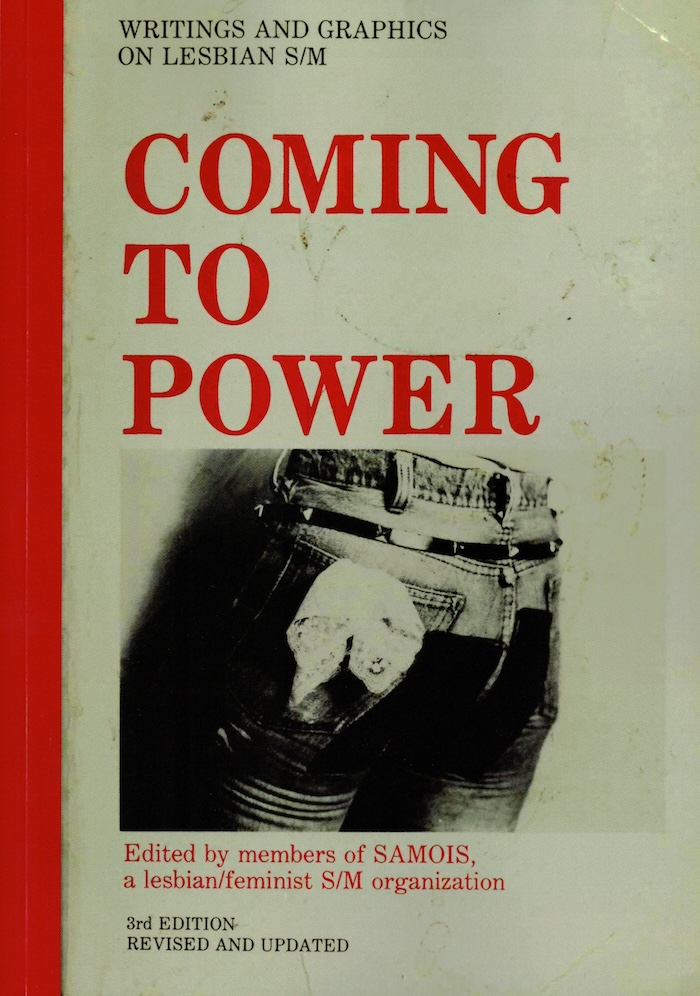
Coming To Power: writings and graphics on lesbian s/m
[reprint] a founding work of lesbian BDSM originally published in 1981.
Coming to Power is more than an attempt to put sex back into lesbian politics. It is an attempt to show, through stories, graphics and analysis, just how political lesbian sex really is. It is an attempt to remind all of us that we must continue our fight to define sexual relations in our own terms as something valid and important. And it’s the best thing that has been published on feminist theory/practice in a long, long time. So let’s go for that long-awaited walk on the wild side.
Samois was a lesbian feminist BDSM organization based in San Francisco that existed from 1978 to 1983. It was the first lesbian BDSM group in the United States.[1] It took its name from Samois-sur-Seine, the location of the fictional estate of Anne-Marie, a lesbian dominatrix character in Pauline Réage's erotic novel Story of O, who pierces and brands O. The co-founders were writer Pat Califia, who identified as a lesbian at the time, Gayle Rubin, and sixteen others.

Dregs, Beacons
Poems on light and remnants. Light as mordant, as acid that etches through surface, as something that wraps itself around and between things, revealing form. The writing touches on dregs, remnants, residue and how we make sense of them, by making constellations and navigating through those diagrams.
Anna-Rose Stefatou (b.1996, Athens) is a Greek-British artist based between Athens and London, working between moving image, installation, photography, and writing. Stefatou’s interdisciplinary works attend to stories attached to place and beginning to exist through writing, whether they become a structure to hold it, or whether language simply runs through them. Language is used both as an outset and as a distillation mechanism for ideas, with materials and imagery in visual works responding directly to the text. Gathering and repositioning knowledge guides her creative process: research includes archival footage, taking interviews, collecting objects, and location visits. This process is made visible through her material approach to the photographic image, transformed through different materials, forms and uses, as it unfolds and re-invents itself within new contexts. Stefatou graduated from the Slade School of Fine Art in 2019. Recently, she undertook a residency at Hospitalfield House, Scotland in 2023. Upcoming projects include an exhibition at Pharmakeion, Athens in 2025 as well as a publication Dregs, Beacons that will be realised in 2025.
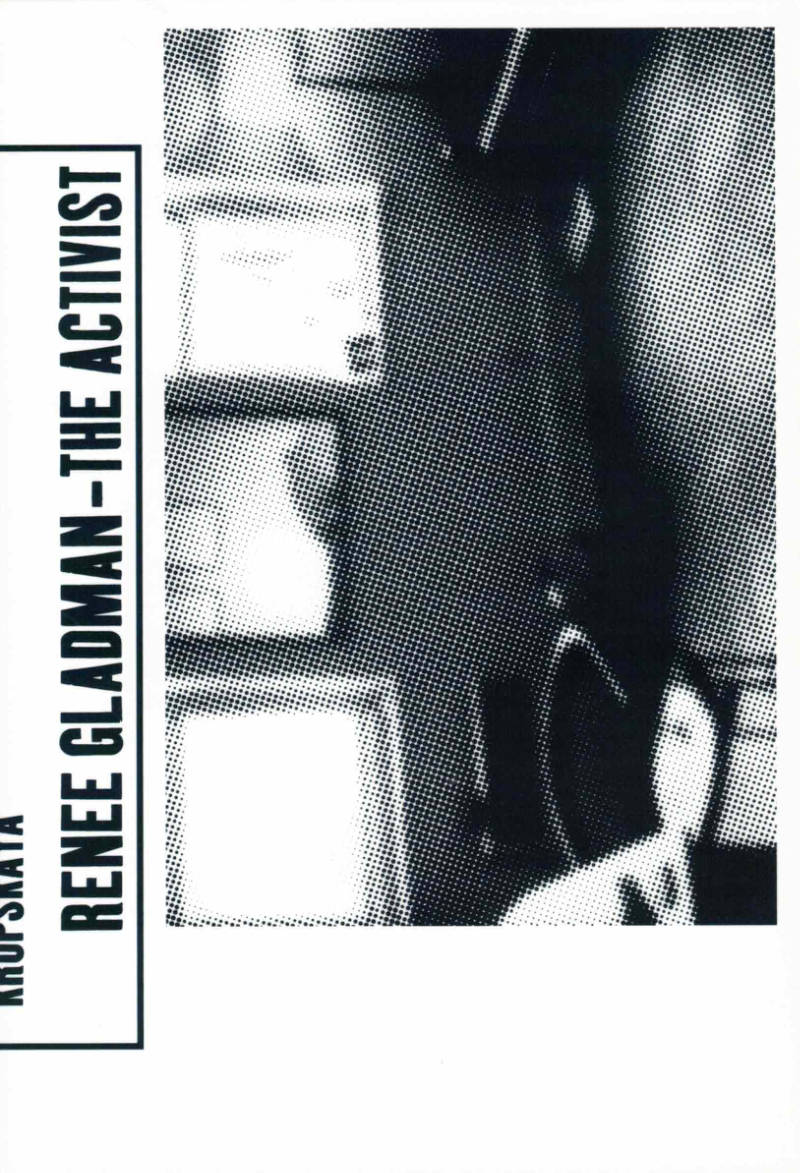
The Activist
The Activist begins in the middle of a revolution. There is a protesting group of commuters with a missing leader. There is a bridge that may or may not have been bombed. People speak in nonsense and cannot stop themselves. In the midst of all this, the language of news reporters mixes with the language of confession. The art of this beautifully written book is in how it touchingly illustrates that relations between humans and cities are linked in a more complex interface than most realize. The book is full of entrances and exist, alternate routes and incommensurate geographies. The Activist does not analyze or explain the hopeful desires of protest at the turn of the century, but it does enable us to see them differently. — Juliana Spahr
"Whether this is a dream in which I'm captured or I've been captured and made to think I'm in a dream, I can't figure." Apropos to the rapturous tension The Activist evokes. A covert narrative operating as an event disguised as a repot. A grass trap glimpsed through the lashes of a sleepwalker. Topography of disrupted positionality, reflection girders flaccid memory against the romantic high up. Flea-bitten news and neuralgic placards. You are here**. Is dreaming the medium for crossing the ambiguous borders of talk, responsibility, collectivity, solitude? Or does reading anatomize a phantom bridge that carries you over to an unmappable reality and calls you by your secret name? Root, plan and faction, armed with tongue-tied intensity. You may ask how Renee Gladman knows that this city of slippage is your city, how she holds you within it, riveted. And therein lies the magic of this book. — Tisa Bryant

Gay Girl Prayers
A collection of poetry reclaiming Catholic prayers and biblical passages to empower girls, women, and members of the LGBTQIA+ community.
The extreme level of sass in Emily Austin’s Gay Girl Prayers does not mean that this collection is irreverent. On the contrary, in rewriting Bible verses to affirm and uplift queer, feminist, and trans realities, Austin invites readers into a giddy celebration of difference and a tender appreciation for the lives and perspectives of “strange women.”
Packed with zingy one liners, sexual innuendo, self-respect, U-Hauling, and painfully earnest declarations of love, this is gayness at its best, harnessed to a higher purpose and ready to fight the powers that be.
"Gay Girl Prayers offers a template for queer resistance to religious doctrine in revised Bible verses. Emily Austin has forged an unholy hymnal, a book of praise songs that shuck off stuffy Christian constraints to embrace instead unrepentant joy. She redefines Heaven not as a place for the puritanical, but rather a series of intimate moments between queer girls ‘who take lamps to one another’s bed chambers' and reimagines, through erotic apocrypha, divinity inclusive of ‘the curious… the closeted… the butches… the femmes… bisexuals, pansexuals… all queer trans people.’ Gay Girl Prayers is a renunciation of orthodoxy, a proclamation of queer solidarity, and a celebration of self-love."
—Evelyn Berry, author of Grief Slut and Buggery
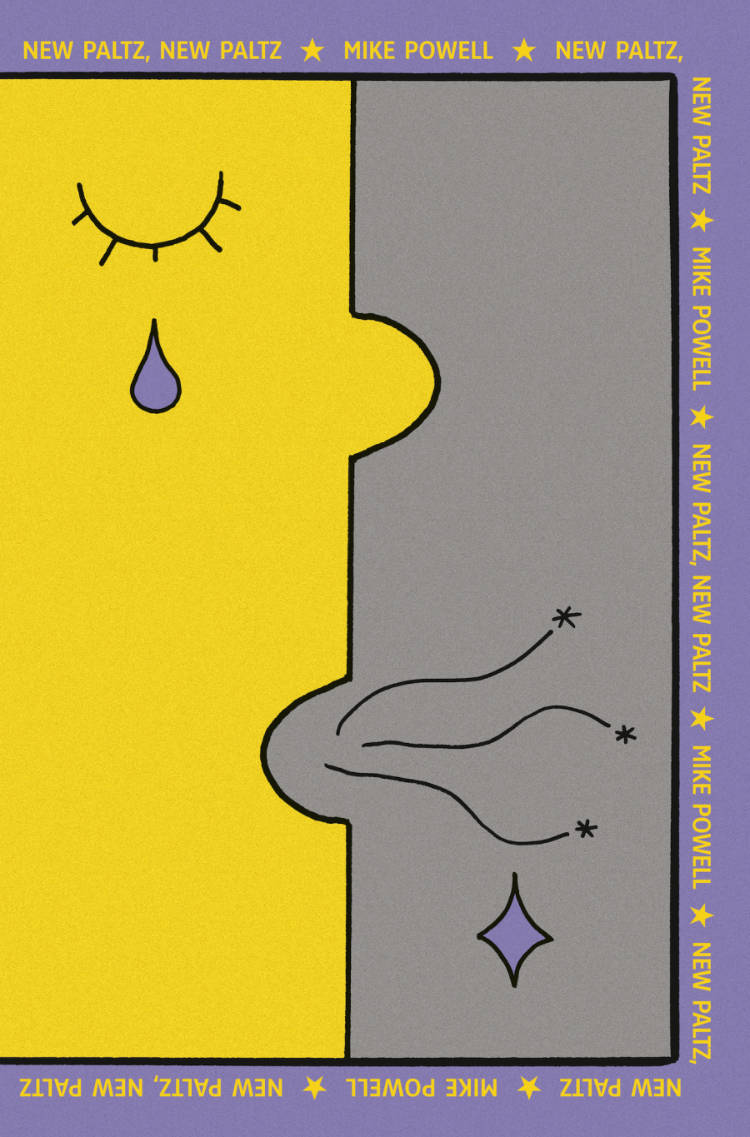
New Paltz, New Paltz
Ben is adrift. A fact-checker at a New York gossip magazine, he is well-versed in the breezy cruelty that makes the modern world go and yet hopelessly drawn to the wonders that world continues to turn up. The hypnotic asymmetry of escalators. A perfectly chilled water fountain. The essential freedom of dogs. Into the stream of this private joy steps a young woman whose general impertinence leads him back to questions about art, ambition, and intimacy he’d misplaced in the scatter that he—when pressed—calls his life.
FILE UNDER
Balthus, bildungsroman, BINGO!, bullshit jobs, clumsy beauty, dumb luck, killed time, the lives of others, mundane surrealism, only in New York, rare victory, shaggy dogs, supposedly fun things, unscripted life, vulnerable worlds, young and broke
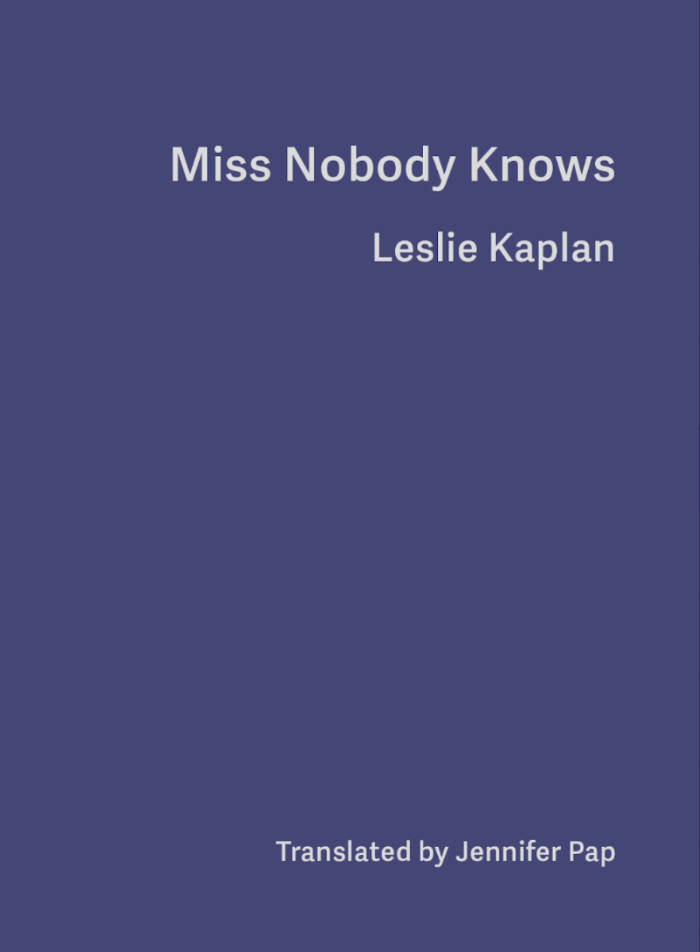
Miss Nobody Knows
The first English translation of Leslie Kaplan's crystalline novella Miss Nobody Knows, about the lived aftermath of May '68: its hopes and failures and how they continue to resonate today.
“Ostensibly about the May '68 strike and a man who cannot deal with its aftermath, but really a love story to these moments when suddenly the utopian comes into view and no longer feels impossible. It’s a book to read right now so as to remember that there have been moments when people come together in the name of possibility, rather than in rage.” —Juliana Spahr
“Thank you for sending Leslie Kaplan's book, so strong and graceful, so… so… so… as if the novel were suspended between the animal and the human.” —Jean-Luc Godard, letter to Paul Otchakovsky-Laurens
“One thought he understood it all, the other wanted to see it all. Through two opposing characters, Leslie Kaplan brings to life something of May '68 … This novel breaks an opening out of the infinitely mad universe that was captured by Leslie Kaplan's first book, Excess-The Factory.” —Claire Devarrieux, Libération

Five Stars: Selected Amazon Reviews, Vol 4
Five Stars: Selected Amazon Reviews, Volume 4 by Kevin Killian, selected by Ted Rees & David Buuck, with introductory words from Kevin edited by Dodie Bellamy. Curated from the over 2500 reviews that William Hall has lovingly archived, this latest edition showcases Kevin’s incomparable mix of wit and sincerity, pleasure and playfulness, his deep love of popular culture, and his unique critical voice.

Sung Hwan Kim: A Record of Drifting Across the Sea
A richly illustrated exploration of Sung Hwan Kim’s complex record of migrant stories, displacement and belonging, border-crossings and translation.
In A Record of Drifting Across the Sea (2017–), Sung Hwan Kim looks at histories of migration. The artist parses the traces –archival and bodily – left by undocumented Korean migrants who came to the US by way of Hawai’i at the turn of the twentieth century, and ponders over their impact on other migrant and indigenous communities. As an ongoing film and installation series, comprising two chapters and a third in progress, A Record unsettles the limits of the ‘one work’ with its distributive, open-ended and collaborative nature.
In this speculative inquiry, Janine Armin explores each chapter in Kim’s multi-layered work as a mycelial network of feelers entangling and extending the wider work in-process. Engaging history through embodiment, folklore and myth, as much as through archival material, Kim navigates and crosses the boundaries between displacement and belonging. Focusing on the artist’s attempt to escape from representation, Armin illuminates and attends to the different stories and non-sovereign ways of being together towards which his work points us.
This title is part of the One Work book series, which focuses on artworks that have significantly changed the way we understand art and its history.

Immemory: Gutenberg Version
Filmmaker, photographer, writer and traveler Chris Marker (1921-2012) never respected boundaries between genres. His landmark 1962 film La Jetée is almost entirely stills, its one moving image as thrilling as the Lumières’ films must have been for their original audiences. Each of Marker’s films (including the widely celebrated Sans Soleil) stretched the definition of the art, merging at times with the essay, political manifesto, personal letter, even computer game.
In Immemory, Chris Marker originally used the format of a CD-ROM to create a multi-layered, multimedia memoir. The reader investigates “zones” of travel, war, cinema, and poetry, navigating through image and text as if physically exploring Marker’s memory itself. The result is a veritable 21st-century Remembrance of Things Past, an exploration of the state of memory in our era. With it, Marker both invented a literary form and perfected it. And yet the digital format he chose for his experiment was quickly rendered obsolete.
Immemory: Gutenberg Version reinvents this unique work for the printed page, a project the author dreamed up, titled, and developed with Exact Change before his death. Now finally realized, Immemory: Gutenberg Version brings this seminal work by Chris Marker into the present and future via a time-tested, durable format of the past — the book.
Edited & with an Introduction by Isabel Ochoa Gold

Beyond Personhood: An Essay in Trans Philosophy
Beyond Personhood provides an entirely new philosophical approach to trans experience, trans oppression, gender dysphoria, and the relationship between gender and identity. Until now, trans experience has overwhelmingly been understood in terms of two reductive frameworks: trans people are either “trapped in the wrong body” or they are oppressed by the gender binary. Both accounts misgender large trans constituencies while distorting their experience, and neither can explain the presentation of trans people as make-believers and deceivers or the serious consequences thereof. In Beyond Personhood, Talia Mae Bettcher demonstrates how taking this phenomenon seriously affords a new perspective on trans oppression and trans dysphoria—one involving liminal states of “make-believe” that bear positive possibilities for self-recognition and resistance.
Undergirding this account is Bettcher’s groundbreaking theory of interpersonal spatiality—a theory of intimacy and distance that requires rejection of the philosophical concepts of person, self, and subject. She argues that only interpersonal spatiality theory can successfully explain trans oppression and gender dysphoria, thus creating new possibilities for thinking about connection and relatedness.
An essential contribution to the burgeoning field of trans philosophy, Beyond Personhood offers an intersectional trans feminism that illuminates transphobic, sexist, heterosexist, and racist oppressions, situating trans oppression and resistance within a much larger decolonial struggle. By refusing to separate theory from its application, Bettcher shows how a philosophy of depth can emerge from the everyday experiences of trans people, pointing the way to a reinvigoration of philosophy.
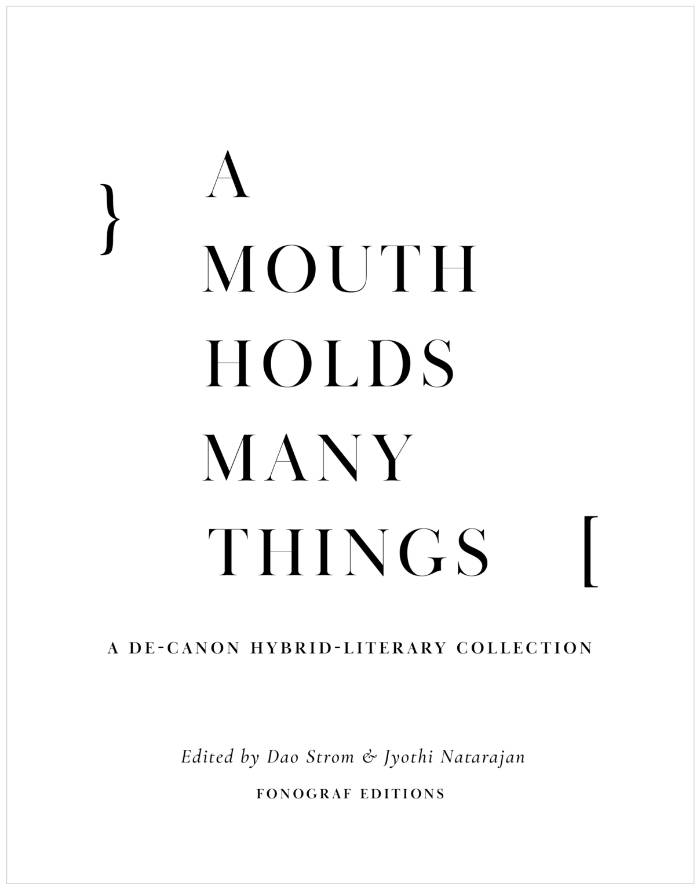
A Mouth Holds Many Things: A De-Canon Hybrid Literary Anthology
A Mouth Holds Many Things collects hybrid-literary works from 36 women and nonbinary BIPOC writer-artists. Spanning experimental poetry and prose, image-text, collage, performance text, AI-generated writing, and more, this ground-breaking full-color print volume illuminates and expands the interstitial spaces where text blends, blurs, and morphs with visual and other media.
At the restless heart of this collection is a challenge to some fundamental questions: What is reading? What is writing? Lifting language beyond the domain of the letter, the works collected here present language in other forms: visual, embodied, sonic, asemic, tactile. Language, after all, is multi-textu(r)al, interwoven, punctured, fragmented, grafted, possessing power to construct and deconstruct, fed into by many rivers of experience: marginalizations and migrations, diasporas and displacements, invisibilities and hyper-visibilities.
A project of the Portland-based literary-social art project, De-Canon, which creates unique spaces and experiments to center works by writers of color, this collection is edited by Dao Strom and Jyothi Natarajan.
A Mouth Holds Many Things was, in the short stories/poetry/anthologies category, the winner of a 2024 PubWest Book Design Award.
Full list of contributors
Stephanie Adams-Santos, Kimberly Alidio, Samiya Bashir, Aya Bram, Victoria Chang, Jennifer S. Cheng, Gabrielle Civil, desveladas (Macarena Hernández, Sheila Maldonado, Nelly Rosario), Carolina Ebeid, Nadia Haji Omar, Christine Shan Shan Hou, Imani Elizabeth Jackson, Vi Khi Nao, Diana Khoi Nguyen, Quyên Nguyễn-Hoàng, Cindy Juyoung Ok, Monica Ong, Shin Yu Pai, Jenne Hsien Patrick, Jennifer Perrine, Alley Pezanoski-Browne, Kelly Puig, Ayesha Raees, Jhani Randhawa, Paisley Rekdal, Daisuke Shen, Sasha Stiles, Sandy Tanaka, Arianne True, Addie Tsai, Vauhini Vara, Divya Victor, Anna Martine Whitehead, Kathy Wu

Plans for Sentences
"These sentences—they—will begin having already been sentences somewhere else, and this will mark their afterlife, and this will be their debut." So begins Renee Gladman’s latest interdisciplinary project, Plans for Sentences. A tour de force of dizzying brilliance, Gladman’s book blurs the distinctions between text and image, recognizing that drawing can be a form of writing, and vice versa: a generative act in which the two practices not only inform each other but propel each other into futures. In this radical way, drawing and writing become part of a limitless loop of energy, unearthing fertile possibilities for the ways we think about poetry.
If Gladman ascribes to any particular type of poetics, here in Plans for Sentences, we are sure to find that it is robustly grounded in a poetics of infinite language.